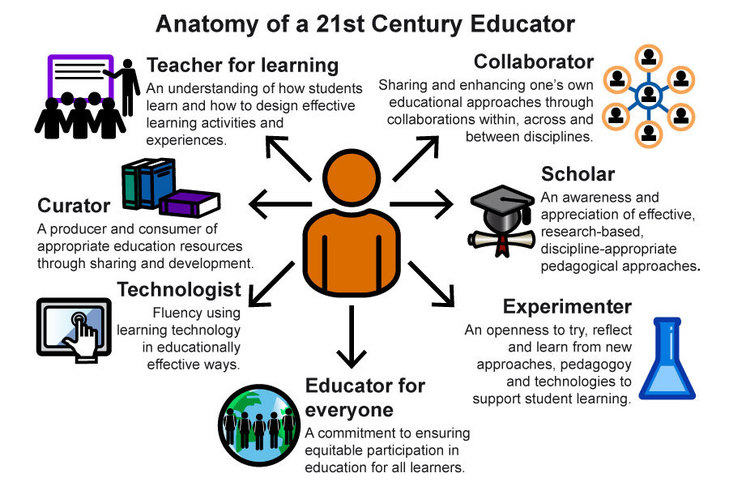ESSRG has been developing an online e-learning platform in Hungarian and English to render research outputs and project-based scientific knowledge more accessible to a larger public. Adaptation of online teaching methodologies became a preference for ESSRG, not merely for disseminating knowledge efficiently but also for offering quality e-courses for adult learners.
Online courses provide an alternative and secure way for knowledge sharing and acquisition during the global pandemic. It allows learners to flexibly organise their schedule and learn independently regardless of their physical location. Although online learning seems fun to do at first glance, this format might bring challenges for individual learners and educators alike. In an online setting, not merely the course design and tasks have rapidly been transforming, but also the role of educators needs to be reconsidered.

Alexandra Czeglédi, a junior researcher at ESSRG, joined the Open University’s microcredential course, entitled ‘Online teaching: Creating Courses for Adult Learners’ at Future Learn to study critical theories, innovative methodologies and acquire practical skills to improve her online course design. She is co-creating a 5-week-long course in the field of citizen science for early carrier researchers in the natural and social sciences in Hungary.
During the 12-week-long course, Alexandra became familiar with key concepts and theories applied in online teachings such as critical digital pedagogy, open pedagogy, the 21st-century educator’s role and group assessment. In addition, she learned how to chose online digital tools and design online teaching activities that best fit her diverse target group. The microcredential course, all in all, paid attention to equitable and inclusive learning and provided her with various templates and sources that can be transfer into any field of expertise.
ESSRG researchers, led by Diana Szakál, are holding regular meetings to develop soft skills in designing online courses and facilitating online learning. They co-develop courses by implementing their know-how in various areas of expertise including agricultural biodiversity, food sovereignty, food systems thinking, science-policy interface and citizen science.
List of ESSRG’s available and upcoming courses:
- An introductory course into Agricultural Biodiversity (Hun)
- Roundtable discussions on Food Sovereignty in Hungary (Hun)
- Systems Thinking for Food Systems Sustainability (Eng)
- Science-Policy Interfaces from an Inner Perspective (Eng)
- Introduction into Citizen Science (Hun)
Selected resources from the microcredential course:
- Connected Learning Alliance (2016) DS106: Enabling Open, Public, Participatory Learning. Available at: https://thecurrent.educatorinnovator.org/resource/ds106-enabling-open-public-participatory-learning
- DeRosa, R. and Robison, S. (2015) ‘Pedagogy, Technology, and the Example of Open Educational Resources’, Educause Review. Available at: https://er.educause.edu/articles/2015/11/pedagogy-technology-and-the-example-of-open-educational-resources
- Douce, C. (2015) E-learning and Disability in Higher Education [online], London, Taylor & Francis Online. Available at https://www.tandfonline.com/doi/full/10.1080/02680513.2015.1013529
- Farrow, R. (2015) ‘Open education and critical pedagogy’, Learning, Media and Technology, vol. 42, no. 2.
- Garrison, D. R. and Anderson, T. (2003) E-learning in the 21st Century: A Framework for Research and Practice, London and New York, RoutledgeFalmer.
- McPherson, E., Collins, T. and Gallen, A.-M. (2019b) Inclusive Group Work for Module Designers [Online]. Available at: https://weblab.open.ac.uk/incstem/incstem-data/uploads/2019/11/designing-group-work-guidance.pdf
- Morris, S. (2016) ‘Teaching in our right minds: critical digital pedagogy and the response to the new’, Hybrid Pedagogy, 22 April [Blog]. Available at: http://hybridpedagogy.org/teaching-in-our-right-minds/
- Salmon, G. (2004) E-moderating: The Key to Teaching and Learning Online, Taylor & Francis e-Library.
- Stommel, J. (2018) How to Ungrade. Available at: https://www.jessestommel.com/how-to-ungrade
- Warburton, S. (2017) ‘How do we interpret technologies in use?’, Liquid Learning. Available at: https://warburton.typepad.com/liquidlearning/2007/11/how-do-we-inter.html/
- Wiley, D. (2016) ‘Toward renewable assessments’, Iterating Toward Openness, 7 July [Blog]. Available at: https://opencontent.org/blog/archives/4691